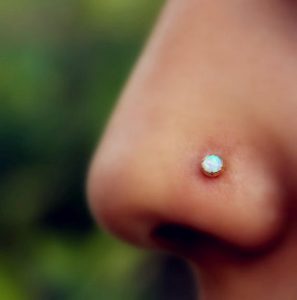
About six weeks ago, I did something that I’ve been thinking about for a solid fifteen years: I got my nose pierced. I can’t tell you that there’s one particular reason why it took me so long to do it; instead, it would be more accurate to describe a million minor discouragements along the way. But when I recently found myself admiring a friend’s piercing (framing the compliment within the narrative of my own unfulfilled intentions), it didn’t take much for her to convince me to go for it.
So a couple of weeks later, this friend and my teenage daughter accompanied me to a local piercing studio. After the piercing was done (and after I felt compelled to tell everyone repeatedly that having a needle shoved through one’s nostril feels just like…..having a needle shoved through one’s nostril), I looked in the mirror and made what would become a prophetic remark:
“It looks like it’s always been there.”
I could not have known at the time that this observation would strangely contextualize the next few weeks of my social life, but it’s important for this story to note that, outside of my husband and other kids, only two people knew of my plans to pierce my nose that night. If all the world’s a stage, I was a little nervous about how my nose would perform the next day.
So you can imagine my surprise when I went about my daily — and very public — life……..and virtually no one noticed. I thought at first that perhaps the piercing was too small, but I reasoned that size had never stopped me from noticing others’ piercings. Then I wondered if others were just being nice, for in the most paranoid recesses of my imagination, people were pitying me for a slightly early midlife crisis and thought it kindest not to comment. (And if you’re feeling this way, keep your opinions to yourself).
But it was in a Facebook post a couple of nights later that the truth of the matter came out, when I jokingly asked the following:
“My version of ‘if a tree falls in the forest…’: If a woman pierces her nose but everyone thought her nose was already pierced, is there really a new hole in her nose?”
In response, a remarkably large number of my friends — many of whom I saw personally in the days and hours before — all commented that they thought my nose was already pierced for, as one friend remarked, “I guess you just look like someone who’d have a pierced nose.” As if this virtual unanimity among friends was not enough, even my own family was oblivious. I picked my mom up from the airport mere days after my piercing, and we had a face to face conversation for several minutes with nothing of consequence mentioned apart from the normal pleasantries (she claims she absolutely would have noticed…. eventually). My sister, who I saw the next week, and who was making sidelong glances at my nose, said she thought that “something was different,” but later admitted that she hesitated to say something because she wasn’t entirely sure that the piercing was new.
I suppose one could conclude from this little story that you should only pierce yourself for yourself (and with this I wholeheartedly agree). But what I find most interesting about this scenario from the perspective of identity studies is how powerful stereotypes can be even when one is supposedly working with individualized, anecdotal information. In other words, we often think of stereotypes as preconceived categories that we apply to people we do not know. This is, after all, precisely why profiling is considered problematic: it attaches attributes to individuals without any reliable confirmation of their accuracy.
But the story of my nose (as silly as that sounds) is one where personal information abounds — that is, those around me (who look at my face daily) had the information at hand to know that up until recently, my nose was not pierced. Instead, they presumably integrated new data (the piercing) with the old (my face, my personality, and existing stereotypes) to concoct a mishmash that is “me” in their minds. Perhaps when it comes to analyzing our experiences, the lesson is that what constitutes the social order is just as much what we anticipate as what we can demonstrate.

In addition to stereotypes, I think we also tend to fixate on the physical changes we make to ourselves (like adding piercings, tattoos, changing our hair, etc) so much that we forget that other people are also busy being overly critical of their own appearance and choices.